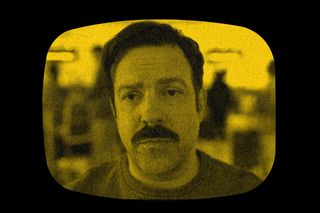
Ted Lasso’s New Season Drives Home Our Disillusionment With Work Culture Today
The first episode of season three highlights how work culture interferes with love and loss.

Note: This article contains spoilers for season three, episode one of Ted Lasso.
Season three of the hit Apple TV show, Ted Lasso begins with the titular protagonist — known for his endless optimism — looking miserable. Lasso, in London’s Heathrow airport to drop his son Henry to his flight back home to Kansas, is seemingly unsettled by the prospect of his son leaving, and even ends up almost missing the final call for his son’s departure. As the episode progresses, Lasso keeps wondering what he is doing, miles and miles away from his home, in a country he doesn’t recognize, coaching a team for a sport he doesn’t know. Elsewhere, Rebecca Welton, Lasso’s boss and the owner of the AFC Richmond football team, is anxious because every organization and expert covering football has predicted that her team will end up at the bottom of the Premier League table. However, what heightens Walton’s anxiety is the prediction that her ex-husband’s new team, West Ham United, would finish in the top four.
It’s an interesting moment in the show, pulling viewers back to how the story began for both Lasso and Welton. The very first episode of the series begins with Welton receiving AFC Richmond as part of her divorce from her ex-husband. Once in charge of things, she decides to sabotage the team by inviting Lasso, an American Football coach who trains college students, to manage the club. Lasso himself takes up the job to make space for his wife, who eventually divorces him a few episodes down. Hence, it is separation that brings Walton, Lasso, and all of AFC Richmond together as one team. And although the last two seasons of the show offered dollops of positivity to its audiences, the new season is a timely reminder that beneath all the showers of hope, positivity, and kindness, the show’s protagonists continue to be affected by the separation. What began as subversions of work culture — wherein jobs are a means to navigate the tribulations of relationships — ended up where it was inevitably meant to go. Slowly, everyone found themselves pulled into the vacuum of work against their prior intentions — and thereby not allowing their grief to breathe.
The show plays into the idea of using work as an often effective distraction from the grief — and other complex emotions — that one goes through after a separation. But as season three points out: that might not be the best idea.
Related on The Swaddle:
Why We Root for Underdogs in Sports
Both Lasso and Welton immerse themselves in work to try and avoid thinking about their grief and pain, in vain. For all his optimism and kindness, Lasso forgets to be kind to himself and take the time to process his own grief, and it inadvertently ends up impacting his work. Hence, he ends up uncharacteristically yelling at Nate as a reaction to having to sign his divorce papers in an earlier season, and looks entirely lost for the better part of the new episode. The grief, and the work that he immersed himself in while trying to not deal with it, has worn him down. He is genuinely lost. As Lasso tells his assistant coach Beard in the final moments of the show, “I know it’s nuts we came here in the first place, but I can’t tell if it’s more crazy or less crazy that we’re still here.”
The episode also explores how work itself may at times be at the root of separation, while also asking whether it is a serious enough reason to let go of love in the first place. In the ending moments of the previous season, the show had hinted at Roy Kent, former AFC Richmond star and presently an assistant coach for the side, and Keely Jones, former model and presently a PR manager, heading for a breakup as they both set to get busier with work. The couple finally decide to split in the first episode of the new season. While they seem to suggest to Phoebe, Kent’s niece, that they are doing it because they’ve both gotten “busier,” Phoebe doesn’t seem to entirely buy it, and later tells her uncle, “I think you’re doing a stupid thing.”
The show thus registers its opposition to the work-life dichotomy at exactly the right moment, when the zeitgeist is itself disillusioned with the failed promise of a healthy working life. Through Lasso and Welton, it highlights how it is impossible to leave one’s thoughts and memories of other things when at work, how it shouldn’t be expected for anyone to be 100% devoid of other emotions and feelings. It questions the culture of compartmentalization for everything, commenting that it really isn’t possible to entirely seal off strong emotions even when one may set aside time for work (read: Severance, an unflinching satire on this very myth). In fact, Jones is shown to be doing exactly that, breaking down during a designated period because of her work. Drowning herself in work requires her to hold off her tears till it’s her designated breakdown time in office, but it is also hinted that those breakdowns have become more frequent.
Thus, the first episode of the new season of the show highlights the importance of making the space and time for relationships and love and life, and for making enough time to be able to process grief and pain. Or, in the end, we might end up being constantly, perennially in grief, and like Lasso we may all end up questioning every choice that we make.
Amlan Sarkar is a staff writer at TheSwaddle. He writes about the intersection between pop culture and politics. You can reach him on Instagram @amlansarkr.
Related


‘Lucky Girl Syndrome’ – The Newest Manifestation Trend That Sets Us up for Failure
